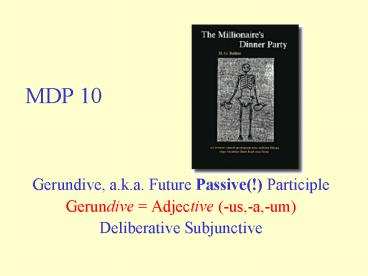MDP 10 - PowerPoint PPT Presentation
1 / 18
Title: MDP 10
1
MDP 10
- Gerundive, a.k.a. Future Passive(!) Participle
- Gerundive Adjective (-us,-a,-um)
- Deliberative Subjunctive
2
In English, a verbal noun ending in ing it has
all the uses of the noun but retains certain
characteristics of the verb, such as the ability
to take an object or an adverbial modifier.
3
In English, a verbal noun ending in ing it has
all the uses of the noun but retains certain
characteristics of the verb, such as the ability
to take an object or an adverbial modifier.
- Studying is worthwhile.
- Studying Latin is very worthwhile.
- The good students are desirous of studying.
- The best students are desirous of studying Latin.
- The library should be suitable for studying.
- The library should always be suitable for
studying Latin. - The good students like studying.
- The best students like studying Latin.
- By studying hard you will succeed in life.
- By studying Latin you will succeed very well in
life.
4
Gerundive a Latin verbal adjective.
5
Formation of a Present Active Participle
- present stem -ns,-ntis
- vocans, vocantis - calling
- monens, monentis - warning
- regens, regentis - ruling
- capiens, capientis - taking
- audiens, audientis - listening
6
Formation of a Perfect Passive Participle
- perfect stem -us,a,um
- vocatus,a,um - having been called
- monitus,a,um - having been warned
- rectus,a,um - having been ruled
- captus,a,um - having been taken
- auditus,a,um - having been heard
7
Formation of a Future Active Participle
- perfect passive stem -urus,-a,-um
- vocaturus,-a,-um - about to call
- moniturus,-a-um - about to warn
- recturus,-a,um - about to rule
- capturus,a,um about to take
- auditurus,a,um about to hear
8
Formation of a Future Passive(!) Participle
(a.k.a.-Gerundive)
- Present Active Stem -ndus,-nda,-ndum
- vocandus,-a,-um about to be called
- monendus,-a-um - about to be warned
- regendus,-a,um - about to be ruled
- capiendus,-a,-um - about to be taken
- audiendus,a,um about to be heard
9
The irregular verb eo, ire, ivi, itus,a,um
goGerundive eundus, eunda, eundum
Deponent verbs form gerundives regularly.
- hortandus, hortanda, hortandum
- pollicendus, pollicenda, pollicendum
- sequendus, sequenda, sequendum
- congrediendus, congredienda, congrediendum
- potiendus, potienda, potiendum
10
Summary of Participles
11
Translations of Participles
- vocans, vocantis calling, while calling
- vocatus,a,um called, having been called
- vocaturus,a,um about to call, going to call,
intending to call, fixin to call, destined to
call - vocandus,a,um about to be called (rare!)
Usually, the Latin gerundive is translated as if
it were an English gerund an object.
HUH??
12
Uses of the Gerundive ( Adjective)
- Genitive causa or gratia (for the sake of)
purpose - (cf. e.g. lt exempli gratia)
- In piscinam me inmisi opis ferendae causa.
- I threw myself in the pool for the sake of
bringing - (to bring) aid.
- Gito cibum sparserat canis placandi gratia.
- Gito had spread food around for the sake of
calming (to calm) the dog. - Dative (I.O. or Adjectives)
- Multum tempus consilio parando dedit.
- He gave much time to/for preparing a plan.
- Hic locus non idoneus ponendis castris est.
- This place is not suitable for pitching camp.
13
Uses of the Gerundive ( Adjective)
- Accusative ad acc. purpose
- Puer surrexit ad versus recitandos.
- The boy rose for the purpose of reciting (to
recite) verses. - Dominus meus Capuam exierat ad servos emendos.
- My master went to Capua for the purpose of buying
(to buy) slaves. - Ablative means
- Pulchro monumento faciendo curamus ut post mortem
vivamus. - We ensure that we live after death by building
beautiful tombs. - Ille versibus male recitandis aures mean
offendit. - He offended by ears by reciting poetry badly.
14
Passive(!) Periphrastic
- Future Passive Participle Sum necessity,
obligation, haftagotta - Hoc faciendum est.
- This has to be done.
- This must be done.
- This ought to be done.
- Melissa mihi adiuvanda fuit.
- I had to help Melissa (Melissa had to be helped
by me). - Naves in monumento faciendae sunt.
- Ships must be fashioned on the tombstone.
15
Passive(!) PeriphrasticFuture Passive
Participle Sum necessity, obligation,
haftagotta
- Pax servanda est.
- The peace must be maintained.
- Scio pontem transeundum esse.
- I know that the bridge must be crossed.
- Censeo Carthaginem delendam esse.
- I feel/move that Carthage must be destroyed.
- Caesar intellexit cur via sequenda esset.
- Caesar understood why the road had to be followed.
16
Passive(!) PeriphrasticUses Dative of Agent
instead of Ablative of Agent
- Pax nobis servanda est.
- The peace must be preserved by us.
- Scio pontem militibus transeundum esse.
- I know that the bridge must be crossed by the
soldiers. - Caesar intellexit cur via sibi sequenda esset.
- Caesar understood why the road had to be followed
by him.
17
Deliberative Subjunctive
- The subjunctive in a main clause is likely to be
- Jussive
- Exeat neve plura dicat
- Let him leave and say no more
- Hortatory/Optative
- Stet haec urbs!
- May this city stand!
- Gaudeamus!
- Let us rejoice!
- Deliberative
- Quid agam?
- What should I do?
- Quo me nunc vertam?
- Where should (can) I turn now?
18
Deliberative Subjunctive
- The deliberative subjunctive is typically a
direct question, using the subjunctive the sense
of potentiality/indecision (might/could/would) - Quid faciamus novi generis labyrintho inclusi?
- What should we do, shut up (as we are) in
- a new kind of Labyrinth?
- Quid facerent novi generis labyrintho inclusi?
- What could they do, shut up (as they were) in
- a new kind of Labyrinth?
- Ad cenam a Trimalchione invitatus, quid diceret
Encolpius? - What could Encolpius say when he was invited to
dinner - by Trimalchio?































